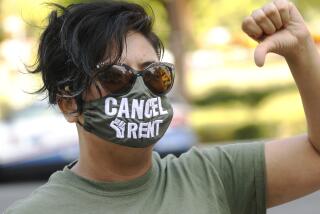Anti-Smoking Law No Longer Enforced : Health: Budget cuts have forced the city attorney’s office to quietly drop the effort. Councilman Wachs vows a motion to put teeth back into the ordinance.
- Share via
The Los Angeles ordinance that outlaws smoking in elevators, supermarkets and parts of workplaces and restaurants is no longer being enforced because of budget cuts, The Times has learned.
The city attorney’s office, charged with enforcing the law, quietly phased out its two-member smoking ordinance team in 1989, and stopped taking complaints altogether in January. Until then, complaints of violations of the 1985 law had been coming into the office at a rate of about 40 a month, officials said.
“At this point, we are relying on voluntary compliance,” spokesman Mike Qualls said.
The revelation drew an angry response from the Task Force for Safe and Healthful Air, a coalition of 33 medical and environmental organizations.
“I think it’s appalling that the city would choose to cut enforcement of a much-needed adjunct to the smoking ordinance,” said Alan Zovar, the group’s coordinator. “Study after study has shown that side-stream smoke is dangerous. If there’s no teeth to the law, the law can be abused with impunity.”
Informed of the enforcement lapse, City Councilman Joel Wachs angrily vowed to introduce a motion today to correct the problem.
“It is the charter responsibility of the city attorney’s office to enforce city laws,” Wachs said. “I’m going to see that the city attorney’s office does its damn job.”
Wachs prevailed in last week’s hard-fought City Council battle over restaurant smoking. The council voted 8 to 7 to order the city attorney to draft his compromise measure, which would enlarge restaurant nonsmoking areas to 60%, from the current 50%.
The enforcement phaseout did not come up during the debate. The council’s biggest anti-smoking crusader, Councilman Marvin Braude, said he learned of the discontinuation in January but did not inform his colleagues because he “thought it was generally known.”
Braude, who had argued unsuccessfully last week for a complete ban on restaurant smoking, added that his proposal, if approved, would have been self-enforcing. “It would have meant you simply could not smoke in a restaurant in this city,” he said.
Braude offered no criticism of the city attorney’s office, but several of his fellow council members did.
Council President John Ferraro and council members Hal Bernson, Ernani Bernardi, Mike Hernandez, Mark Ridley-Thomas, Michael Woo and Zev Yaroslavsky faulted the agency for failing to announce it had pulled the plug on the law.
“They should have let the City Council know they had phased out enforcement and why,” Yaroslavsky said.
Representatives of organizations concerned about healthful air in public places said they, too, were surprised and disappointed to learn that the city’s smoking ordinance is only a paper tiger.
“I’m disturbed that this was not an aspect of the council’s debate,” said Jeff Alpert, a spokesman for the American Lung Assn. “Why even have a smoking ordinance?”
Ray Melrose, chairman of the Tobacco Activities Task Force, California Division, American Cancer Society, said, “Any neglect of an anti-smoking ordinance is serious neglect.
“The City Council, along with health groups and organizations, spent an enormous amount of time and energy to further control smoking in this city--only to find the city attorney has stopped enforcing the existing law,” Melrose said. “I find that disgusting.”
The city’s smoking ordinance had been enforced between 1985 and 1989 by a law clerk and a hearing officer in the city attorney’s criminal hearings division, Qualls said.
The clerk, who earned $22,438 a year, and the hearing officer, who earned $41,808 annually, handled up to 40 smoking-related complaints a month until funding for the positions ran out in 1989. About half the complaints were about workplaces; the rest involved businesses ranging from restaurants to supermarkets, he said.
“There never was a criminal case filed against an establishment because all of the complaints were resolved by the hearing officer through time-consuming mediation,” Qualls said.
Most cases took about eight hours of staff time to resolve by telephone and correspondence between the hearing officer and the managers and owners of various establishments, Qualls said. Targets of complaints included the Beverly Center, the Amtrak reservation area at Union Station, the Playboy Club in Century City and a Greyhound bus drivers’ lounge in downtown Los Angeles, he said.
The city attorney’s office continued to accept smoking complaints at a rate of about 40 a month until this January, when “we began experiencing a three-month backlog of regular criminal cases and had to make some hard choices,” Qualls said. “Smoking was dropped.”
City Atty. James K. Hahn said the City Council is to blame for the budget cutbacks that forced him to eliminate the enforcement unit. “If they’ll restore funding, I’ll get the job done.”
Meanwhile, some hailed news of the phaseout.
“Wonderful!” exclaimed Gerald Breitbart, spokesman for the 3,000-member California Restaurant Assn., which has opposed efforts to strengthen the restrictions or enact a total ban in eateries. “But I think the vast majority of restaurants are following the law without enforcement.”
Even Braude agreed with that assessment, suggesting that the strongest enforcement comes with the “looks that nonsmokers give to smokers when they light up where they aren’t supposed to.”
More to Read
Sign up for Essential California
The most important California stories and recommendations in your inbox every morning.
You may occasionally receive promotional content from the Los Angeles Times.














